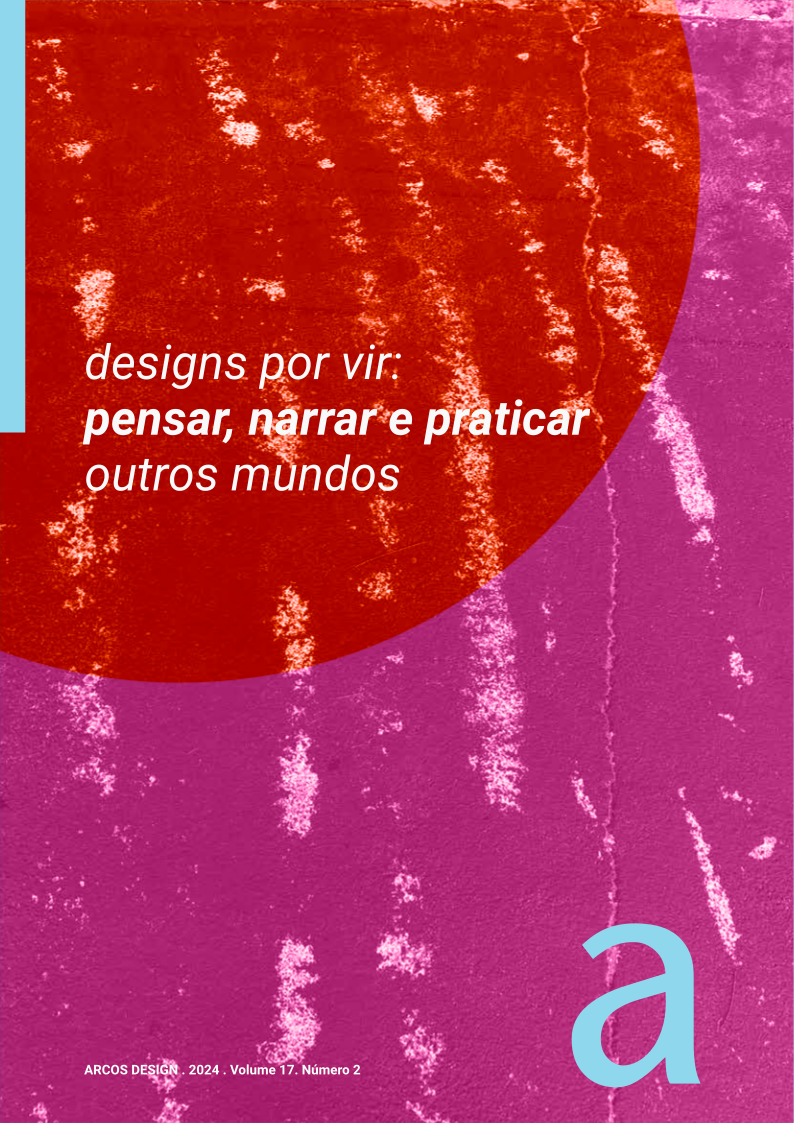Encontro como empoderamento
uma abordagem crítica à pesquisa de design participativo com jovens marginalizados
DOI:
https://doi.org/10.12957/arcosdesign.2024.81797Palavras-chave:
Pesquisa em design participativo, Juventude marginalizada, Paisagem urbanaResumo
Este artigo apresenta uma pesquisa de design participativo realizada com jovens marginalizados de São Paulo, Brasil. O projeto consistiu em duas atividades que utilizaram mapeamento e jogos de tabuleiro para explorar instabilidades e incertezas nas comunidades dos participantes. As oficinas tiveram como objetivo promover encontros e destacar as capacidades e a agência dos jovens. Os métodos visuais resultantes capturaram as experiências dos participantes sobre a paisagem urbana, demonstrando o potencial da pesquisa em design participativo para abordar questões sociais e capacitar comunidades marginalizadas.
Downloads
Referências
CRAMPTON, J. Maps as social constructions: power, communication and visualization. Progress in Human Geography, v. 25, n. 2, p. 235 - 252, 2001.
DÁVILA, P. Diagrams of Power: Visualising, Mapping and Performing Resistance. Eindhoven, Onomatopee, 2019. ISBN 9493148033.
DE CERTEAU, M. The Practice of Everyday Life. Berkeley and Los Angeles, London, University of California Press, 1988. ISBN 978-0-520-23699-8.
DELEUZE, G.; GUATTARI, F. A Thousand Plateaus: Capitalism and Schizophrenia. London, Athlone Press, 1988. ISBN 048511335X.
DIAS, I. Interview with the Judge Iberê de Castro Diaz at the end of the workshop at USP on 9th abr. 2023.
DRUCKER, J. Diagrammatic Writing. Eindhoven, Set Margins, 2023. ISBN 978-90-832706-1-6.
EASTERLING, K. Disposition. In HAUPTMANN, D.; NEIDICH, W. (Eds). Cognitive Architecture: from biopolitics to noopolitics. Rotterdam, 010 Publishers, 2010. p.250-265. ISBN 9064507252.
EASTERLING, K. Extrastatecraft: the power of infrastructure space. London and New York, Verso Books, 2016. ISBN 1784783641.
HALL, P.A.; DÁVILA, P. Critical Visualisation: Rethinking the Representation of Data. London, Bloomsbury Publishing, 2022. ISBN 1350077240.
HARFORD, T. The never-ending brilliance of board games. Disponível em: https://www.ft.com/content/2fe3bf14-4be0-4b19-b739-3943f837a879. Acesso em: 27 jan. 2024
JACKSON, S. J. Rethinking Repair. In GILLESPIE, T.; BOCZKOWSKI, P.J.; FOOT, K.A. (Eds) Media Technologies: Essays on Communication, Materiality, and Society. Cambridge, Massachusetts, The MIT Press, 2014. p. 221-239. ISBN 9780262319461.
LANTZ, F. The Beauty of Games. Cambridge, Massachusetts, The MIT Press, 2023. ISBN 0262048531.
MORGAN, J. GO: Gabriel Orozco. London, Tate Publishing, 2011. ISBN 9781854379122.
NGUYEN, C. T. Games and the Art of Agency. Philosophical Review, v. 128, n. 4, p. 423-462, 2019.
SLETTO, B. We Drew What We Imagined: Participatory Mapping, Performance, and the Arts of Landscape Making. Current Anthropology, v.50, n.4, p. 443 - 466, 2009.
STAR, S.L.; STRAUSS, A. Layers of Silence, Arenas of Voice: The Ecology of Visible and Invisible Work. Computer Supported Cooperative Work, v. 8, p. 9 - 30, 1999.
TEMKIN, A. Gabriel Orozco. London, Tate Publishing, 2010. ISBN 1854379216.
WILLIS, D. The Emerald City and Other Essays on the Architectural Imagination. New York, Princeton Architectural Press. 1999. ISBN 9781568981741.
Downloads
Publicado
Como Citar
Edição
Seção
Licença
Copyright (c) 2024 Paul Wilson, Andrea Thoma, Maria Cecilia Loschavio dos Santos

Este trabalho está licenciado sob uma licença Creative Commons Attribution-NonCommercial-ShareAlike 4.0 International License.
Autores que publicam nesta revista concordam com os seguintes termos:
- Os Direitos Autorais dos artigos publicados na revista Arcos Design pertencem ao(s) seu(s) respectivo(s) autor(es), com os direitos de primeira publicação cedidos à Arcos Design com o trabalho simultaneamente licenciado sob uma Licença Creative Commons CC BY-NC-SA 4.0, a qual permite o compartilhamento do trabalho com reconhecimento da autoria e publicação inicial nesta revista. Para mais informações ver: https://creativecommons.org/licenses/by-nc-sa/4.0/
- O(s) autor(es) tem/têm autorização para assumir contratos adicionais separadamente, para distribuição não-exclusiva da versão do trabalho publicada nesta revista (ex.: publicar em repositório institucional ou como capítulo de livro), com reconhecimento de
autoria e publicação inicial nesta revista. - Autores têm permissão e são estimulados a publicar e distribuir seu trabalho online (ex.: em repositórios institucionais ou na sua página pessoal) a qualquer ponto antes ou durante o processo editorial, já que isso pode gerar alterações produtivas, bem como aumentar o impacto e a citação do trabalho publicado.


